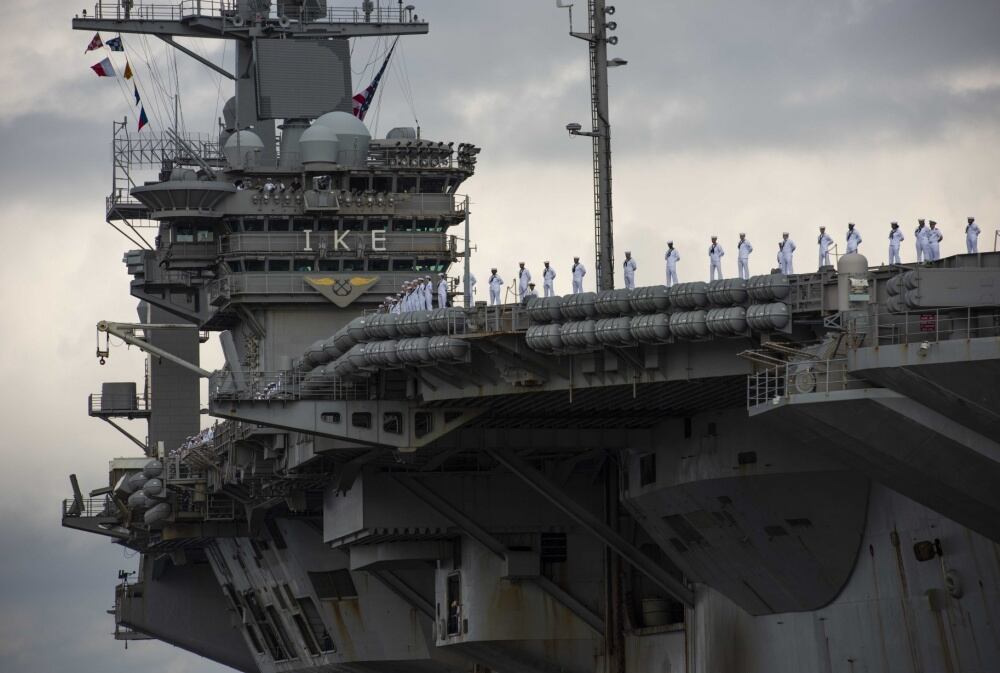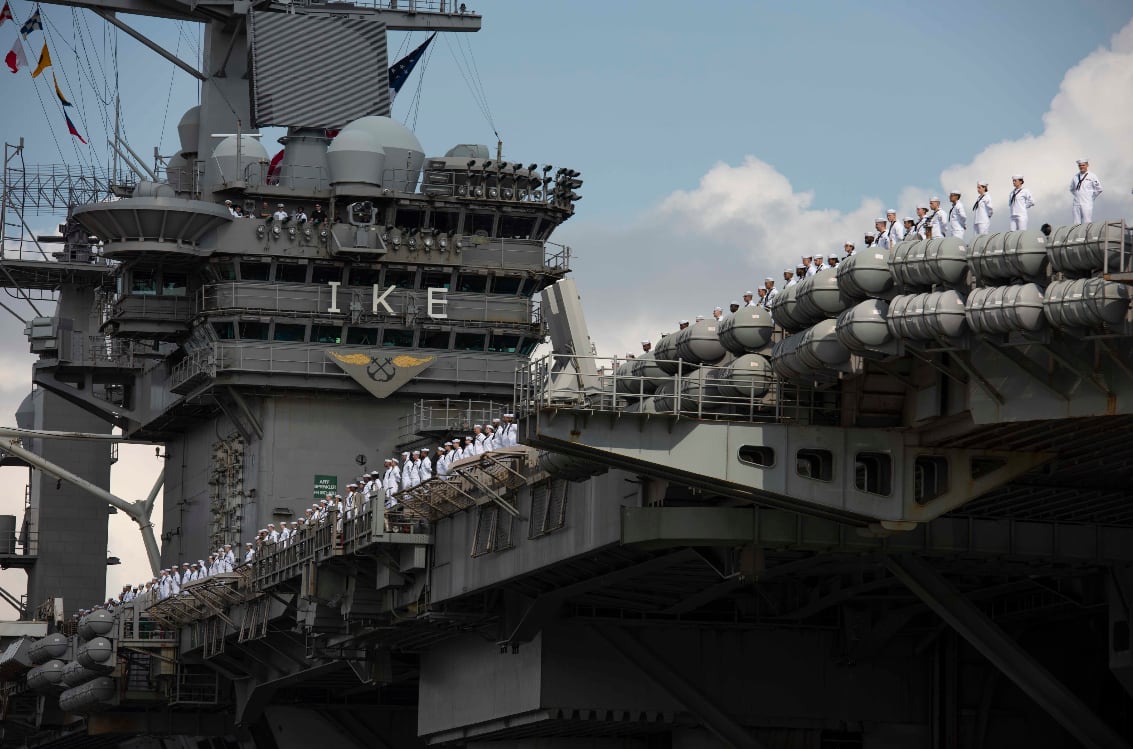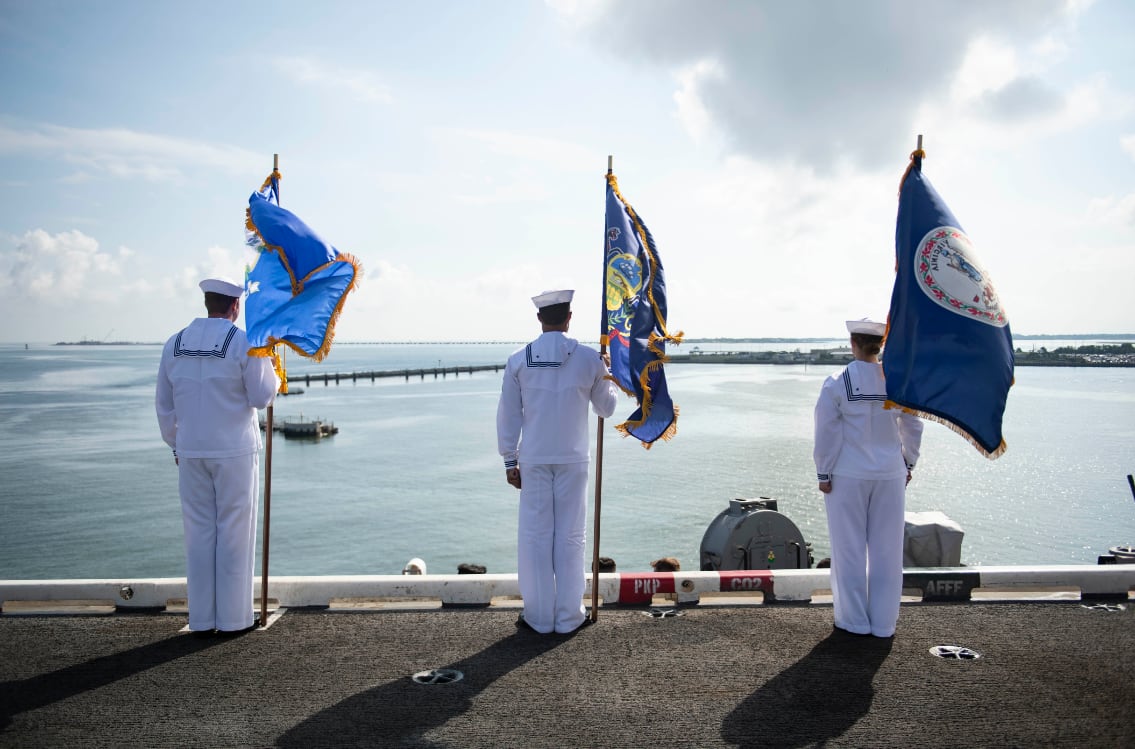For endless months, as the aircraft carrier Dwight D. Eisenhower steamed through a record-breaking 206 days at sea with no port calls, at least one sailor just wanted off the ship.
The crew had left Virginia on Jan. 17, when COVID-19 was little more than a concerning blip on America’s radar.
But when the sailors finally stepped off the boat at Norfolk Naval Station Aug. 9, wrapping up a seven-month tour in U.S. 5th and 6th fleets, they reentered a country some of them barely recognized.
There was no celebration, no homecoming, just “hug your loved ones in the car, figure it out, just go,” the Ike sailor told Navy Times.
“We came back to protests and threats going on and COVID,” the sailor said. “It’s kind of scary. It gives me anxiety a little. I’ve been talking to other people on the ship like, ‘How you holding up? I don’t want to leave the house.‘ ”
RELATED

The sailor asked to remain anonymous because crew members weren’t authorized to speak publicly about the lengthy deployment.
“Just about everyone that was on the boat with us that I’ve spoken to is going through some type of anxiety,” the sailor said this week. “They’re anxious and they can’t figure out why.”
Lines in the grocery store make the sailor uneasy these days, as does idle time of any kind.
The sailors must also now remember to bring their mask, as well as their keys and wallet, when they head out.
“If I’m out for too long, I’m anxious because I can’t see anyone’s face,” the sailor said. “All I see is eyes.”
By mid-March, as the Ike steamed and the novel coronavirus changed everything, the sailor realized there would be no port calls on this cruise, and that the roughly 5,500 sailors aboard the carrier were going to be onboard for the long haul.
“Everybody was like, we’re never getting off this ship,” recalled the sailor.
As the spring season progressed, scuttlebutt spread among shipmates about what was going on back home and the coronavirus outbreak aboard the carrier Theodore Roosevelt.
The command would get on the carrier’s main public address circuit and attempt to dispel rumors.
“The rumor that was not killed was that we’re never getting off the boat,” the sailor said.
But, the sailor feels the command did its best under very difficult circumstances.
Shipmates were given weekends or days off where they had no duties “and you could just wear civilian clothes to feel human.”
“Capt. (Kyle) Higgins, (the carrier’s commanding officer), was really cool,” the sailor said. “He kept us updated on everything.”

Some shipmates took the lack of port calls in stride, while others were upset.
“There were some people that were more understanding than others,” the sailor said. “Some people who had been on deployment before said, ‘Think about it this way: It can’t ever be worse than this. The next deployment won’t be so bad.’”
“It’s one of those situations where you got the short end of the stick,” the sailor noted. “You’re either going to make the best of it or you’re going to dwell on it.”
The Navy’s top officer has acknowledged the strain that deployments in the COVID-19 era are placing on sailors.
While port calls have decreased, ships are implementing “stand-down days” in which sailors are given a day off, Chief of Naval Operations Adm. Mike Gilday told NBC News earlier this month.
“Everybody needs a break once in a while and I do think that the toughest challenge, I believe, in a situation like this is trying to understand what that threshold is and not pushing it too far,” Gilday said. “You know when people are tired, people are frazzled.”
An adjustment to operating schedules is likely, the chief told NBC News.
“Now we have to have ships stay at sea another month or so longer as they do their training, and instead of taking leave right after training before deployment, they roll right into deployment,” he said. “And so we’re going to have to take a closer look at whether or not we can sustain that for a prolonged period of time and make some recommendations up the chain of command.”
This sailor does not presume to speak for the entire Ike crew, but said the deployment was not all bad.
“It was a learning experience,” the sailor told Navy Times. “I learned about myself, I learned about the other sailors on the ship.”
It was easier to focus on qualifications or study for advancement because there was nothing else, the sailor said.
A deployment high point included the crew becoming the Navy’s first-ever “Iron Shellbacks” after they crossed the equator on May 14 after more than 100 days at sea.
Crew were also given “Oh, the places you won’t go” T-shirts, the sailor said.
“All the ports we were supposed to hit were on there with a line through it,” the sailor said. “They found ways to make light of the situation.”
And while they didn’t pull right into port, they came close. The sailor recalled seeing Egypt from the water, steaming through the Mediterranean Sea and transiting the Suez Canal.
But uncertainty about what was going on back home, coupled with endless days at sea, eventually eroded even the most can-do attitudes.
“I think it was, like, month five,” the sailor said. “I was like, alright, I’m over this shit.”

As the Ike’s deployment neared its end, leaders held meetings with sailors to explain to them the changed world to which they would soon return.
Sections practiced mask wearing and social distancing as well, the sailor said.
“Our captain kept on reminding us that we haven’t had to live with COVID,” the sailor recalled. “He reminded us that you’re going to get off this boat eventually, please remember that the world is different.”
Before they walked off the ship and back onto land, the sailor said their unit leadership told them to be proud of what they had endured.
“Everyone’s still here, no one lost their minds completely,” the sailor said. “This is the worst deployment you’re ever going to be on, but you made it out.”
Geoff is the managing editor of Military Times, but he still loves writing stories. He covered Iraq and Afghanistan extensively and was a reporter at the Chicago Tribune. He welcomes any and all kinds of tips at geoffz@militarytimes.com.








